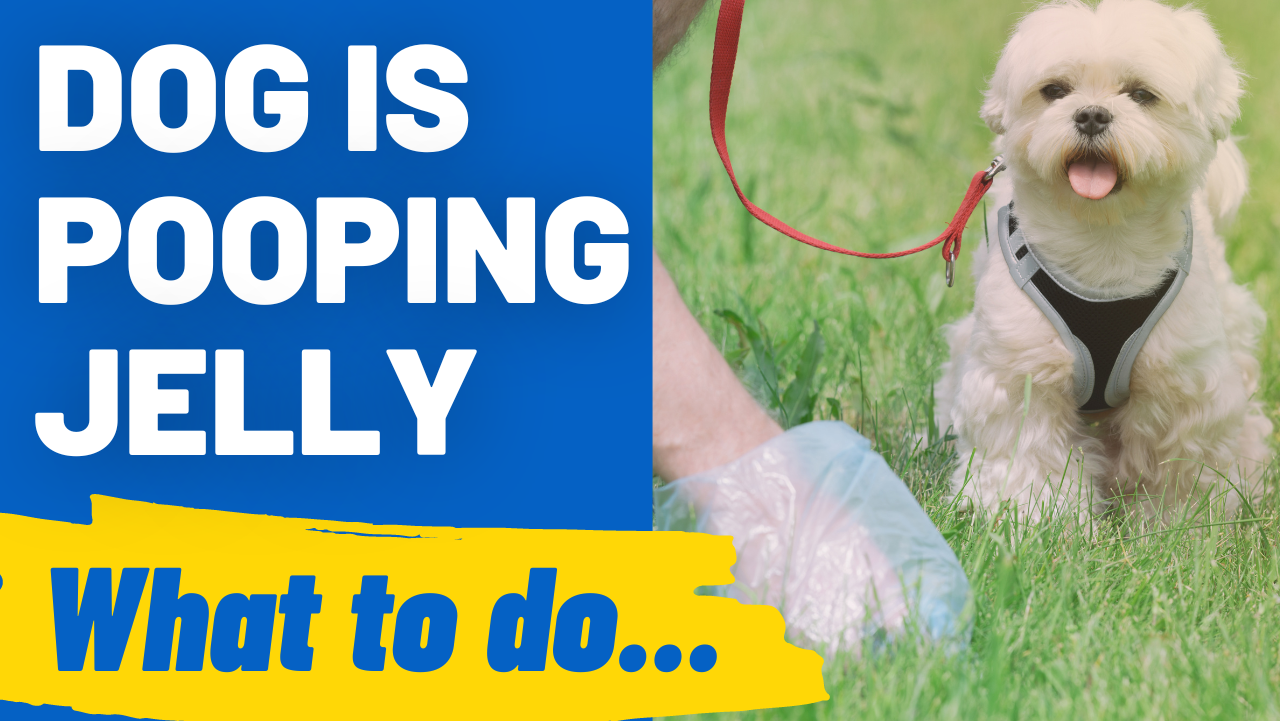Does it look like your dog is pooping jelly? This may be a normal poop color but have a jelly consistency, and it can also be different colors such as yellow, red, or green. All of these can have different meanings and you will need to do different things to manage each situation correctly. So let’s explain each one and what you can do to help.
What does jelly or mucus dog poop mean?
If your dog has jelly or mucus in their poop this often means that they have a gastrointestinal (GI) issue. These are a few common GI issues that will cause mucus in your dog’s poop:
- Gastroenteritis
- Hemorrhagic Gastroenteritis (HGE)
- Stress diarrhea
- Pancreatitis
- Parasites
- Sudden change in their diet
What to do if your dog has jelly poop
If your dog has jelly poop, it is best to withhold food for 4 to 6 hours, then feed a bland diet like chicken and rice. This food is easy for your dog’s stomach to digest and will not cause any more irritation to the lining of their intestines.
Dog poop looks like jelly with blood
If your dog’s jelly poop also has blood in there, this can mean that your dog has a bleed in their GI tract. This is often seen with dogs with Hemorrhagic Gastroenteritis or HGE. These dogs often will need IV fluids and injectable medication to help. They are also often not feeling well and vomiting and not eating.
You might like to read our post, Dog Drinking Water and Vomiting? Here’s Why…
Home remedy for jelly dog poop
If your dog is acting normal and healthy but just has jelly poop you can try some of these remedies to help treat your dog’s diarrhea at home:
Make sure your dog stays hydrated
Your dog will want to drink a lot of water and it’s important that you give them access to it. It’s important to help prevent them from getting dehydrated. You can give them Pedialyte diluted 50/50 with water in addition to fresh water to help keep them hydrated.
You might like to read our post, How Much Water Should Your Dog Drink: (With Chart!)
Give your dog a bland meal
A bland diet such as boiled chicken breast, white rice, and a scrambled egg will help with your dog’s jelly poop.
Make sure when you are preparing this meal that you DO NOT use any butter, oils or spices. You will want this meal to be as plain as you possibly can.
We also have this post you might be interested in, Can Chicken Give Dogs Diarrhea? Answered!
Give probiotics to your dog
There are many different probiotics that can be easily found at your local pet store or online pet retail store. These probiotics will help rebalance your dog’s normal gut bacteria.
We recommend this probiotic powder for dogs. If your dog has an upset stomach, a powder is a good option to put on some boiled chicken and white rice.
Give your dog a dewormer
If you think that your dog is having jelly poop because they have parasites, you can give them an over-the-counter dewormer such as PetArmor Dewormer. You can also find these at the local pet store or ask your vet for help treating these parasites.
Give your dog over-the-counter diarrhea medication
If your dog is also having diarrhea along with the jelly stool, you can give your dog Imodium to help, such as this one from Vets Preferred. For the tablet version, small dogs need ½ tablet, medium dogs need 1 tablet and large dogs need 2 tablets twice a day.
You might like to read our posts, How long does puppy poop stay soft? Answered!
Or this one, Picking up Dog Diarrhea: on grass, in public, at the park
These at-home treatments should help improve the jelly poop in just a day or two. If your dog is not improving or getting worse, it is always best for them to see a vet for prescription medications.
Cause and Treatments for jelly in dog poop
If your dog is having stomach issues, they may benefit from having bone broth. We have this post that can help choosing the right one for your dog: Can Dogs Have Store-Bought Chicken Broth?
These are some of the most common reasons that your dog has jelly poop:
Gastroenteritis
This is an inflammation and infection in your dog’s GI system. This can also cause your dog to vomit and not want to eat.
Hemorrhagic Gastroenteritis (HGE)
HGE often has bloody jelly diarrhea. The stool often resembles raspberry jam. These dogs are sloughing the lining of their intestines due to an infection, stress or infection.
Stress Diarrhea
If your dog has been to a new dog park, boarding facility, or groomer, they can easily develop stress diarrhea. Some dogs will even have diarrhea if their normal routine has been changed. This small amount of stress will cause them to have jelly-like diarrhea.
So if your dog has been having a busy day or two, give them some time to relax and calm down and see if their poop returns to normal. A lavender oil diffuser can help calm your dog down if they are stressed, but don’t use as much as you would for a human. Dog’s sense of smell is up to 10,000 stronger than a human!
Pancreatitis
If your dog eats something that they should not have, such as fatty human foods, they can develop jelly diarrhea. This is often seen along with vomiting, lethargy, and not eating.
Give them a day or two for their gut to settle, however, if the symptoms persist, be sure to visit your veterinarian.
Parasites
Some dogs will have intestinal parasites. They can get these parasites from your backyard, the dog park, or any other area where animals have been.
While many times you may see these parasites in your dog’s stool, some parasites are microscopic and cannot be seen.
Sudden Change in their Diet
If you had to suddenly change your dog’s diet, they may develop jelly diarrhea. This can easily be avoided by slowly changing their dog food over time. It is best to do this gradually over 7 to 10 days or longer if your dog has a sensitive stomach.
Although this post is primarily about the health concerns of your dog, you might also want to know how to best clean up jelly dog poop, in which case be sure to read our post, Can You Put Lime on Dog Poop? (Answered).
Can anxiety cause jelly or mucus in dog poop?
Anxiety and stress is a very common cause of jelly or mucus dog poop. Most dogs are often eating and drinking and acting normal, they just have a little mucus in their stool.
There are diets that are bland and easier for your dog to digest that can help with stress diarrhea. Also, certain supplements will help decrease stress and anxiety in dogs.
Many times, I recommend that a dog that is going to a boarding facility start on a calming probiotic for a few days before they go, while they are there, and for a few days when they come back home to help prevent diarrhea from the stress and anxiety levels.
When to seek help from a veterinarian
For mild cases of jelly diarrhea, you can try some of the at-home remedies that are listed above to see if it helps clear up your dog’s jelly diarrhea. If your dogs have more severe jelly diarrhea they will need to see your vet.
These are common reasons that your dog will need to see your vet for their jelly poop:
- Bloody diarrhea
- Lethargic
- Vomiting
- Dehydrate
These symptoms definitely require a visit to your vet. They will want to take a fecal sample and possibly run bloodwork and take x-rays to find out why your dog has jelly poop.
Once your vet has determined the cause of the jelly poop, your vet will then be able to easily treat your dog’s jelly poop.
For severe cases of diarrhea, your vet will recommend that your dog stays in the vet hospital to receive IV fluids and injectable medications to help rehydrate your dog and help them feel much better faster.
You might also like to read our post, Is Scotts Thick’R Lawn Safe for Dogs, and Other Fertilizers?
Are there any dietary or supplement aids for dogs with jelly poop?
There are some great supplements that you try for your dog who has jelly poop. These are a few that I have found very helpful:
Probiotics
One of the best probiotics that you can give to your dog to help with their jelly poop is Fortiflora by Purina.
Calming supplements
There are also calming supplements that you can give that also contain a probiotic, especially if your dog is having jelly poop due to stress. Calming care is a great supplement for you to try on your dog.
Anti-diarrhea supplements
Pro-pectalin is a great gel supplement that you can give to your dog to stop their diarrhea. This is usually a one-time treatment that you can give to your dog to help.
If your dog is still having diarrhea after trying these supplements, it is best for your dog to see your vet to make sure that they do not have anything more serious going on.
Final Thoughts
Jelly poop in dogs is commonly seen among all breeds and ages. There are many different causes, some of which can easily be identified and treated while others will need bloodwork and possible x-rays from your vet to determine the cause.
If your dog is having jelly poop, you can try some of these at-home remedies to help clear the jelly poop. If their jelly poop does not quickly improve, it is best to see your vet for prescription medications.




